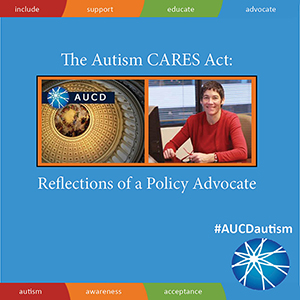The Autism CARES Act: Reflections of a Policy Advocate
April 5, 2016

|
As we celebrate Autism Awareness and Acceptance Month, I paused to reflect on the progress achieved since the passage of the Autism CARES Act (P.L. 113-157), a law for which I helped to advocate. CARES stands for Collaboration, Accountability, Research, Education, and Support. Originally titled the Combating Autism Act (P.L. 109-419) and signed by President George W. Bush in 2006, the law was intended to dramatically increase the federal government's response to what was then perceived as a crisis in the increasing numbers of individuals diagnosed with Autism Spectrum Disorders (ASD). Instead of creating a totally new infrastructure system to address this urgent national priority, the law called for researching, then expanding and coordinating existing federal efforts, bringing together several entities: research within the National Institutes of Health (NIH), surveillance and awareness activities at the Centers for Disease Control and Prevention (CDC), and professional development and research into evidence-based interventions at the Health, Resources, and Services Administration (HRSA). An Interagency Autism Coordinating Committee (IACC) was created and tasked with making sure that all federal agencies were coordinating their efforts, sharing information, and obtaining input from people on the autism spectrum and family members as well as other outside experts.

I got involved in the development of the bill as a disability advocate at the Association of University Centers on Disabilities. My brother-in-law with autism and intellectual disabilities (pictured) lived with us for several years before moving into his own apartment, which gave me first-hand knowledge and increased my interest for increasing services, supports, and public awareness for families.
With over 100 Centers around the country affiliated with major research universities, AUCD members were then and continue to be heavily involved in research, education, training, and technical assistance related to ASD. The Leadership Education and Neurodevelopmental and Related Disorders (LEND) program, a network of then-34 interdisciplinary graduate level training programs to which AUCD provides comprehensive technical assistance, were already very involved in helping to train professionals to screen, diagnose (or rule out), and provide interventions for individuals with developmental disabilities, including autism. The CARES Act increased the authorization for funding to grow the focus on this particular spectrum disorder and to expand the number of LEND training programs with the eventual goal of one in every state. Because of this increase, the number of LEND programs has since increased to 43 in 39 states - with two more states expected to have LENDs by June 2016.
According to the congressionally mandated Report to Congress required by the law, in 2010 LEND programs provided interdisciplinary diagnostic evaluations for more than 35,000 infants and children nationwide. With the expanded number of health professionals in training, LEND programs provided interdisciplinary diagnostic evaluations for over 94,000 infants and children nationwide in 2014-15. By continuing to meet the growing demand for diagnostic services, LENDs are effectively reducing wait times for important diagnostic evaluations and entry into intervention services. Because the LEND programs also work to target underserved populations, their efforts are helping to address disparities in the early identification of ASD and other developmental disabilities.
The original CARES Act, then called the Combating Autism Act, was advocated for strongly by families of children with ASD. Many of these families were (and currently are) caring for children with significant health and behavioral health needs little or no supports. I believe that the law has resulted in a much better understanding of ASD. With the increased funding at NIH, researchers have made significant progress in understanding the etiology of ASD, along with many other neurological variations in the human brain. It is hoped that these understandings will lead to early interventions while the brain is still malleable as well as interventions throughout the lifespan including into adulthood that improve the quality of life for individuals and families searching for assistance.
I believe the Autism CARES Act has led to the development of much broader understanding by educators, job developers, and the general public that will ultimately lead to greater acceptance, less stigma, and thus greater economic independence and more fulfilling lives for those on the spectrum. One of the most interesting developments since I first worked on the law's passage is the rise of the advocacy movement led by autistic individuals. These advocates, individually and as a group, are making incredible strides to help the public not only understand, but celebrate, neurodiversity. They are a strong voice in advocating for services and supports for youth and adults seeking an end to discrimination in employment and housing as well as services for those who are aging. I look forward to working with them in this endeavor.







